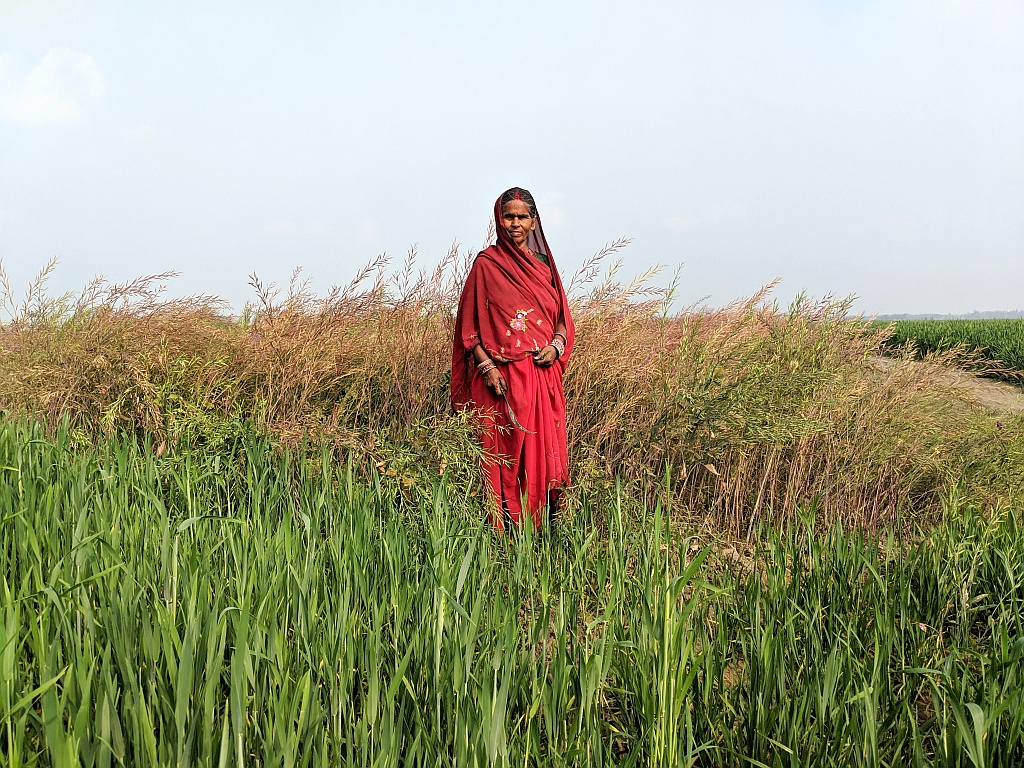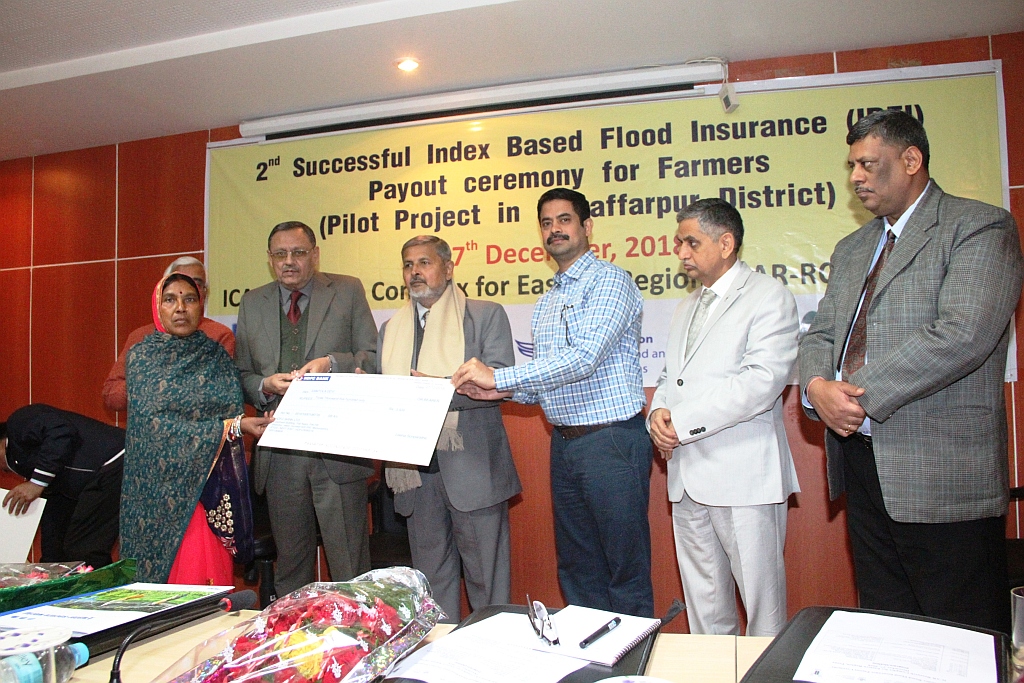New rounds of pilot testing and post-flood recovery in India

Following the successful debut of index-based flood insurance (IBFI) in India’s Bihar State during 2017, the International Water Management Institute (IWMI) and its partners have continued their search for ways to make this tool more effective in helping farm families manage disaster risk. Bihar is the country’s most flood-prone state, with about 40 million hectares subject to periodic flooding.
In 2018, a team of researchers guided by IWMI Research Group leader Giriraj Amarnath conducted a new pilot evaluation of the insurance product with just over 400 farmers in 11 villages of Bihar’s Muzaffarpur District. Including two villages that had taken part in the 2017 pilot, the new evaluation involved changes in the flood threshold, based on consultations with local communities. The work was carried out as part of the CGIAR Research Programs on Climate Change, Agriculture and Food Security (CCAFS) and Water, Land and Ecosystem (WLE) and with support from the Indian Council of Agricultural Research (ICAR).
What sets IBFI apart from conventional products is that it uses modelling and satellite imagery with other data to determine when and where flooding reaches the threshold at which damage is severe enough to warrant compensation. Faster and more efficient than conventional field assessments, this high-tech approach simplifies decision-making and speeds the delivery of insurance payouts to farmers.
“This science-based product shows a lot of potential for removing bottlenecks from crop insurance in India and elsewhere,” said Alok Sikka, IWMI’s India Representative. “It offers a simple and efficient way to widen farmers’ access to agricultural insurance, providing the Indian government with a huge opportunity to alleviate agrarian stress through its ongoing crop insurance scheme.”
In contrast with severe flooding across northern Bihar during 2017, drought hit 23 districts of the state in 2018. At the same time, however, there were significant pockets of flood damage. As a consequence, the overall amount of the payout last year was considerably lower than in 2017, though clearly important for the farmers whose crops were damaged by floods.
As announced during an insurance payout event held in late December 2018 at the Eastern Region Complex of the Indian Council of Agricultural Research (ICAR) in Patna, 170 farmers received compensation, with a total value of 353,000 Rupees (or about USD 5,000), from the insurance companies HDFC Ergo and SwissRe. Since the insurance product is still undergoing pilot evaluation, these farmers did not pay the insurance premiums, a cost that was covered instead with project funds.
Farmer interest in IBFI continues to be strong. “Intense floods cause heavy crop losses in our fields almost every year,” said Jagtaran Devi, a farmer from Bhatgama village. “This scheme has compensated the loss to some extent, but more work needs to be done,” he added, echoing the views of other farmers present at the payout event.
In 2019, IWMI and its partners are undertaking a new initiative focused on post-flood recovery. They will “bundle” IBFI with the dissemination of stress-tolerant crop varieties, so that farmers can diversify their production and thus enhance its resilience. The idea is to ensure good access to seeds just after the flood season, enabling farmers to take advantage of excess soil moisture for crop production.
 In 2018, 63 farmers received a total of 46.2 kilograms of seed of 11 crops. “We distributed seed of vegetables (like cauliflower, tomato, chili and okra) as well as the winter maize variety Shaktiman-3 to farmers in flooded areas,” said P.S. Brahmanad, a principal scientist with the ICAR Indian Institute of Water Management (IIWM). “We reached an agreement with seed companies in 2018 to ensure that adequate supplies of quality seeds are available in flood-affected areas.
In 2018, 63 farmers received a total of 46.2 kilograms of seed of 11 crops. “We distributed seed of vegetables (like cauliflower, tomato, chili and okra) as well as the winter maize variety Shaktiman-3 to farmers in flooded areas,” said P.S. Brahmanad, a principal scientist with the ICAR Indian Institute of Water Management (IIWM). “We reached an agreement with seed companies in 2018 to ensure that adequate supplies of quality seeds are available in flood-affected areas.
To boost the distribution of improved crop seed and related practices to farmers, researchers will introduce market and other innovations aimed at overcoming barriers to variety adoption, such as a lack of trust in seed quality and limited access to credit. “Over the next 3 years, we will refine our risk management approach among smallholders through public-private partnerships, with the aim of scaling it out,” said Giriraj.
The flood-recovery effort will include an advisory service, which farmers can access via smartphone. It is expected to boost awareness and adoption of new technologies in farm communities, particularly among women and youth. IWMI and ICAR are conducting a survey to monitor crop growth and yields, and evaluate the impact of the interventions.
During the 2019 IBFI payout event, Shri Vyas Ji Mishra, vice chairman of the Bihar State Disaster Management Authority (BSDMA), underlined the importance of such actions, noting that 28 of the state’s 38 districts are flood prone. In some locations, floods and drought strike at the same time, since floods in Bihar are caused, not so much by heavy rains within the state, but rather by rivers flowing into it from Nepal and by siltation of the River Ganges. Mishra stressed the need for holistic solutions that rely on forecast services to advise communities and planners, and that promote better technologies to raise farmers’ incomes and enhance climate resilience.

